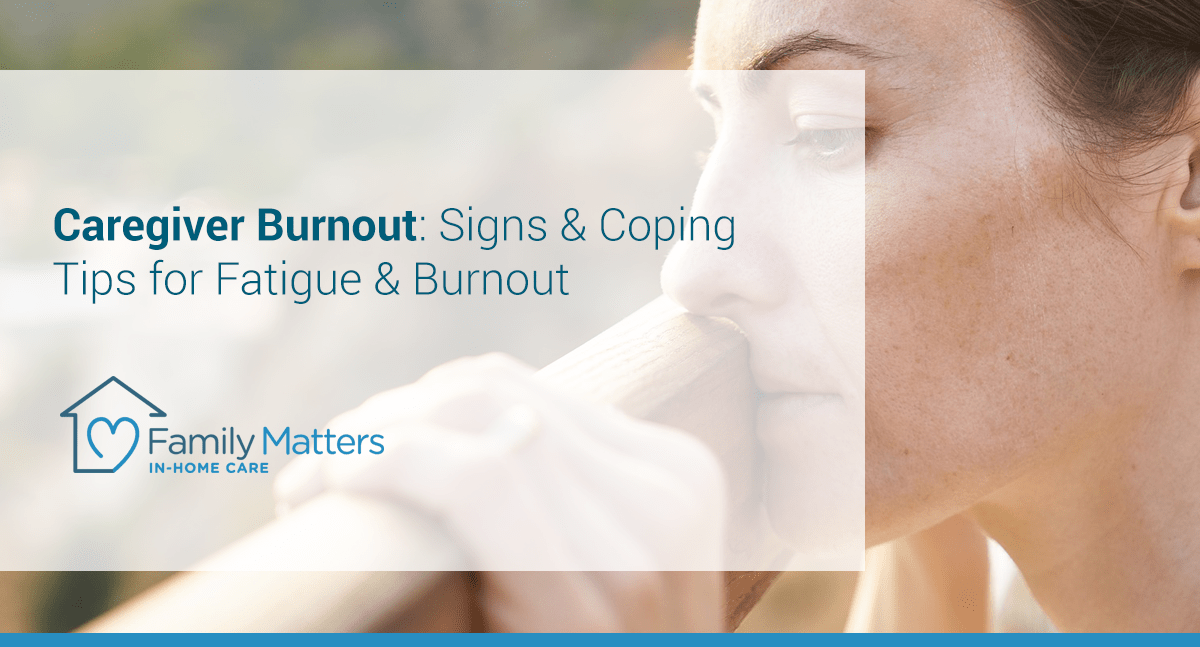
Caregiver Burnout: Signs & Coping Tips for Fatigue & Burnout
Being a caregiver can be an exhausting and difficult task. It’s important to recognize caregiver burnout and cope healthily.
Understanding caregiver burnout symptoms and coping mechanisms can help make caregiving more enjoyable and fulfilling.
About 1 in 3 adults serves as an informal caregiver to another adult, like an aging parent or disabled relative. Although many find the opportunity to care for a loved one to be a privilege, it can also be demanding. Here is how to cope effectively.
Signs of Caregiver Burnout
Caregiver burnout is a state of exhaustion that may result in a change of attitude. The exhaustion can be physical, emotional, and/or mental. Common signs of burnout include:
- Lack of energy
- Sleeping too little or too much
- Feeling fatigued
- Sense of hopelessness, despair
- Weight loss or gain
- Loss of interest in hobbies and activities
- Neglecting one’s own needs
- Feeling like one’s life revolves around caregiving
- Growing impatient or irritable with loved ones
- Worrying excessively about the future
- Mood swings or depression
- Challenges coping with everyday tasks or problems
- Headaches, stomach aches, and other physical signs of stress
- Getting sick easily
Caregiver Burnout Risk Factors
Caregivers are more likely to experience burnout if they:
- Are female
- Live with the person they are caring for
- Are socially isolated
- Have depression
- Face financial difficulties
- Spend most of their hours caregiving
- Didn’t have much choice
Tips for Coping with Caregiver Burnout
Burnout doesn’t have to be a permanent condition. Use these tips to prevent and cope with caregiver burnout.
Ask For and Accept Help
Others may desire to or be willing to help with caregiving tasks, even if only temporarily.
Set Realistic Goals
Understand that not all tasks can be done all of the time. Consider saying “no” to extra requests and demands.
Connect with Others
Find a support group, talk to a friend regularly, and connect with others who can listen and understand.
Avoid Common Causes of Burnout
Caregiving for too many hours, not having space to process emotions, lack of sleep, and other issues are common causes of burnout. Avoid these to recover and prevent further exhaustion.
Make Time for Yourself
Make time for rebuilding and recharging—consider scheduling time for the gym, naps, doctor appointments, and self-care activities.
There are many options for caregiving. Caregivers should not feel they are the only ones who can help their loved ones because the pressure will cause or exacerbate burnout. Involve other loved ones in caregiving, find an adult day care, or consider a private aide.
If you or your family member is considering in-home care as part of a plan to age in place, contact Family Matters In-Home Care today for a free consultation. Our team is dedicated to supporting your family and helping older adults enjoy life in the comfort of their own home for as long as possible.
Some of the services offered by Family Matter In-Home Care include: Alzheimer’s & Dementia Care, Bed & Wheelchair Transfer Assistance, Companionship, Housekeeping & Meal Preparation, Personal Care, Recovery Care, and Transportation.
Serving the San Francisco Bay Area and Greater San Diego, Family Matter In-Home Care has offices in Campbell, CA, Palo Alto, CA, Pleasanton, CA, San Marcos, CA, and San Mateo, CA.
Sources:
- https://cdn2.hubspot.net/hubfs/1708580/Marketing%20Monthlies/PDFs%20from%20Windfarm%20Marketing/1118-CaregiverBurnout-RGB.pdf?t=1540662434989
- https://www.webmd.com/healthy-aging/caregiver-recognizing-burnout#1
- https://www.vitas.com/resources/caregiving/signs-of-caregiver-burnout
- https://www.mayoclinic.org/healthy-lifestyle/stress-management/in-depth/caregiver-stress/art-20044784
